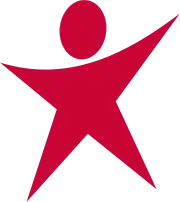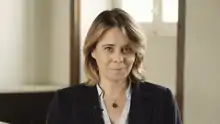Left Bloc (Portugal)
The Left Bloc (Portuguese: Bloco de Esquerda, pronounced [ˈblɔku ðɨ ɨʃˈkeɾðɐ]; abbr. BE,[15] colloquially shortened as O Bloco) is a left-wing populist, democratic socialist political party in Portugal founded in 1999. It is currently led by Mariana Mortágua.[16]
Left Bloc Bloco de Esquerda | |
|---|---|
 | |
| Abbreviation | BE |
| Leader | Collective leadership |
| Coordinator of the Political Commission | Mariana Mortágua[1] |
| Founded | 24 March 1999 |
| Merger of | |
| Headquarters | Rua da Palma, 268 1100-394 Lisbon |
| Newspaper | Esquerda |
| Youth wing | Jovens do Bloco[2] |
| Membership (2009) | 6,830[3] |
| Ideology | |
| Political position | Left-wing[10] to far-left[11] |
| European affiliation | |
| European Parliament group | The Left in the European Parliament – GUE/NGL[14] |
| Colours | |
| Assembly of the Republic | 5 / 230 |
| European Parliament | 2 / 21 |
| Regional Parliaments | 3 / 104 |
| Local government (Mayors) | 0 / 308 |
| Local government (Parishes) | 0 / 3,066 |
| Election symbol | |
.png.webp) | |
| Party flag | |
 | |
| Website | |
| www | |
History
Formation and early history
.jpg.webp)
The Left Bloc was formed in March 1999 by the merger of the Marxist People's Democratic Union, Trotskyist Revolutionary Socialist Party, and the democratic socialist Politics XXI.[17] It has had full party status since its founding, yet the constituent groups have maintained their existence as individual political associations, retaining some levels of autonomy in a loose structure. In the 1999 legislative election the BE polled at 2%. In 2002 this rose to 3%.
First parliamentary representation
.jpg.webp)
In the 1999 election BE received 2.4% of the votes leading them to enter the Assembly of the Republic for the first time with 2 MPs for the Lisbon constituency. These representatives were Francisco Louçã and Fernando Rosas. In the 2005 election BE received 6.5% of the votes winning them 8 MPs. In the 2006 presidential elections, the Left Bloc's candidate, Francisco Louçã, received 288,224 votes (5.31%).
In the 2009 European Parliament election they received 10.73% winning them 3 MEPs. They also surpassed the CDU for the first time in an election. At the subsequent 2009 national election, the party obtained 9.81% of votes and 16 members of parliament in the 230-seat Assembly of the Republic.
The financial crisis led socialist prime minister Sócrates to agree to a bailout memorandum with the Eurogroup. In the subsequent 2011 snap election, the country saw a massive shift to the right, with the Left Bloc losing nearly half of its previous popular support, obtaining only 5.17% of the vote and 8 members of parliament. This defeat is generally attributed to the partial support certain sections of the party appeared to offer the unpopular Socialist government while the latter pursued an austerity program in response to the financial crisis.
Renewal, split and recovery


The historical merger of ideologies that gave rise to the Portuguese Left Bloc was a process that lasted sixteen years. Its main actors aged and times changed, which led to an awareness of the need for modernization and realism. Francisco Louçã is one of the founders who most insisted on restricting theory to the basic humanistic and ethical principles common to partisans and supporters in order to conquer a wider range of constituencies. The game would necessarily be played in the framework of democracy, active participation and defence of human rights. After thirteen years of intensive labor as a leader, Louçã quit the position of party chairman in 2012 arguing that "it is time for renewal" and delegating his functions to a man and a woman.[18] Catarina Martins, 39 years old, and João Semedo, a veteran, would be elected co-chairmen of the party on November 11, 2012. However, the renewal process would last for over one year.[19]
In early 2014, the Left Bloc suffered a split, when elected Left Bloc MEP Rui Tavares, who already in 2011 had become an independent, founded left-ecologist LIVRE party. Left-wing intellectuals who had come together to the Manifesto 3D collective challenged the Left Bloc to converge with LIVRE towards a joined list in the upcoming 2014 European election. Two official meetings in late 2014 and early 2015 however failed with the Left Bloc referring to programmatic differences with Tavares.[20] So while the severe austerity programs under prime minister Passos Coelho did backdrop on the Portuguese political right, the European election in May saw the Socialists and liberal Earth Party as relative winners, whereas the Left Bloc lost more than half of 2009's votes and two of its three mandates. LIVRE received 2.2% but failed to win any mandate.
On 10 November 2015, the Left Bloc signed an agreement with the Socialist Party that is aimed at identifying convergence issues, while also recognizing their differences.[21] The Bloc supported the minority Socialist Costa Government (2015–2019) with a confidence and supply agreement. The Socialist Party government would be re-elected in 2019, with the Left Bloc returning to opposition. The party voted against the 2022 budget, triggering an election in January of that year. The Left Bloc would lose 14 seats, reducing them to five, and over half of their popular vote from 2019 — tactical voting for the Socialist Party and the Left Bloc's opposition to the budget were blamed. The Socialist Party would be re-elected with a majority government.
.jpg.webp)
In 2023, Catarina Martins left the Left Bloc's leadership and was replaced by MP Mariana Mortágua.[22]
Ideology, political position and policies
The Left Bloc rose to prominence "following a successful anti-austerity campaign and its backing by a growing popular social movement."[23] It has been described as "Portugal’s biggest supporter of feminist, gay rights and anti-racist legislation" and been associated with the New Left.[24] It occupies a flexible and moderate position to the left of the Socialist Party (PS).[25] The Bloc has proposed a number of important laws on civil rights and guarantees, including the protection of citizens from racist, xenophobic, and homophobic discrimination, support for same-sex marriage, laws for the protection of workers and anti-bullfighting legislation. These included Portugal's first law on domestic violence, which was then passed in parliament with the support of the Portuguese Communist Party and the Socialist Party. In comparison to the Portuguese Communist Party, the Left Bloc has been described as "more socially libertarian".[24] At present, together with the PS, Left Bloc aims at "building a stable, long-lasting and reliable majority at the Parliament, in order to support the formation and subsequent action of a government committed to the change demanded through the ballot box". This purpose foreshadows changes taking place not only in the Iberian Peninsula but as in all European territory.[26][27][28][29]
The Left Bloc has called for the legalisation of cannabis in Portugal.[30] The party attempted to pass legislation in Parliament regarding cannabis law reform in Portugal in 2013 and 2015, both of which were rejected by the then ruling centre-right coalition government.[31]
In terms of economics the party advocates "greater state intervention in the economy in order to reduce inequalities", such as rises to the minimum wage.[32][33] It has also put forward "many legislative proposals defending salaries, pensions and the welfare state".[34] The party has been described by some sources as being anti-capitalist.[35][36] In September 2019, the party called for the minimum monthly wage to be raised to €650 for both the public and private sectors in January 2020.[37]
Electoral results
Assembly of the Republic
Vote share in the Portuguese legislative elections
| Election | Leader | Votes | % | Seats | +/- | Government |
|---|---|---|---|---|---|---|
| 1999 | Francisco Louçã | 132,333 | 2.4 (#5) | 2 / 230 |
Opposition | |
| 2002 | 153,877 | 2.7 (#5) | 3 / 230 |
Opposition | ||
| 2005 | 364,971 | 6.4 (#5) | 8 / 230 |
Opposition | ||
| 2009 | 557,306 | 9.8 (#4) | 16 / 230 |
Opposition | ||
| 2011 | 288,923 | 5.2 (#5) | 8 / 230 |
Opposition | ||
| 2015 | Catarina Martins | 550,945 | 10.2 (#3) | 19 / 230 |
Opposition (2015) | |
| Confidence and supply | ||||||
| 2019 | 498,549 | 9.5 (#3) | 19 / 230 |
Opposition | ||
| 2022 | 244,603 | 4.4 (#5) | 5 / 230 |
Opposition |
European Parliament
| Election | Leader | Votes | % | Seats | +/- |
|---|---|---|---|---|---|
| 1999 | Miguel Portas | 61,920 | 1.8 (#5) | 0 / 25 |
|
| 2004 | 167,313 | 4.9 (#4) | 1 / 24 |
||
| 2009 | 382,667 | 10.7 (#3) | 3 / 22 |
||
| 2014 | Marisa Matias | 149,764 | 4.6 (#5) | 1 / 21 |
|
| 2019 | 325,450 | 9.8 (#3) | 2 / 21 |
List of coordinators
| Name | Portrait | Constituency | Start | End | Prime Minister | ||
|---|---|---|---|---|---|---|---|
| 1 | Francisco Louçã (b. 1956) |
_(4026598621).jpg.webp) |
Lisbon | 24 March 1999 | 10 November 2012 | António Guterres (1995–2002) | |
| Durão Barroso (2002–2004) | |||||||
| Santana Lopes (2004–2005) | |||||||
| José Sócrates (2005–2011) | |||||||
| Passos Coelho (2011–2015) | |||||||
| 2 | João Semedo (1951–2018) |
.jpg.webp) |
Porto | 10 November 2012 | 30 November 2014 | ||
| Catarina Martins (b. 1973) |
.png.webp) |
Porto | 28 May 2023 | ||||
| 3 | António Costa (2015–present) | ||||||
| 4 | Mariana Mortágua (b. 1986) |
 |
Lisbon | 28 May 2023 | Incumbent | ||
References
- "Mariana Mortágua: De braço direito de Catarina Martins a líder do Bloco de Esquerda". 28 May 2023. Retrieved 28 May 2023.
- "Bloco de Esquerda - Resultados da VII Conferência de Jovens do Bloco de Esquerda". www.bloco.org.
- "Bloco de Esquerda comemora décimo aniversário", Público (newspaper), 28 February 2009, retrieved 21 August 2013
- March, Luke (December 2011). Radical left parties in Europe. Routledge. p. 1801. ISBN 9781136578977.
- "Where is Portugal's Radical Left? – Global Politics". 11 February 2015. Retrieved 7 January 2018.
- "Populism Report Q3 2018" (PDF). Foundation for European Progressive Studies. Archived from the original (PDF) on 27 March 2019. Retrieved 27 March 2019.
- "Portugal's bright outlook offers Europe some hope". Financial Times. 25 August 2019. Archived from the original on 10 December 2022.
The alliance between Mr Costa's Socialist Party (PS) and further left groups such as the anti-establishment Left Bloc was considered tenuous when it was forged in 2015.
- Wall, Derek (2010), The Rise of the Green Left: Inside the Worldwide Ecosocialist Movement, Pluto Press, p. 97
- "Country profile – Portugal - Euroviews 2014". www.euroviews.eu. Retrieved 7 January 2018.
-
- "Risque pays du Portugal : Politique". Société Générale (in French). Retrieved 11 May 2019.
- "Portugal - Political Parties - Elections". perspective.usherbrooke.ca (in French). Retrieved 11 May 2019.
- "Portugal : la coalition de droite conserve le pouvoir". perspective.usherbrooke.ca (in French). 26 October 2015. Retrieved 11 May 2019.
Deux autres partis de " gauche " étaient en lice pour les élections. Premièrement, le Bloc de gauche, considéré par le journal The Guardian comme étant une version portugaise du parti politique grec anti-austérité Syriza, a récolté 10,2% des suffrages (8).
- "Portugal, Le paysage politique". BiblioMonde (in French). Retrieved 11 December 2018.
BE, le Bloc des gauches (Bloco da Esquerda) : formation regroupant l'extrême gauche portugaise depuis 1999. Influente dans les milieux intellectuels de la capitale, BE a obtenu 2,7% des voix et 3 députés en mars 2002 (soit un siège de plus qu'en 1999). BE comprend notamment l'Union démocratique populaire (União Democràtica Popular), le Parti socialiste révolutionnaire (Partido Socialista Revolucionario ) et Politica XXI.
. - "When the Socialists came to power in 2015, they won the parliamentary support of two left wing parties, the Left Bloc and the Communists". Reuters. 31 July 2019.
- "Risque pays du Portugal : Politique". Société Générale (in French). Retrieved 11 May 2019.
-
- "Left Bloc (BE)". The Democratic Society. 19 May 2014. Archived from the original on 28 May 2019. Retrieved 26 August 2018.
The Left Bloc is the more socially libertarian, and bohemian of Portugal's two far-left structures.
- Cunha, Carlos (2008). Few but Pure and Good Members are Preferred to a Mass Party – The Portuguese Communist Party's Continued Orthodoxy. p. 197.
{{cite book}}:|work=ignored (help) - March, Luke (2008). Contemporary Far Left Parties in Europe (PDF). Berlin: Friedrich-Ebert-Stiftung. p. 4. ISBN 978-3-86872-000-6.
- "As Europe left struggles, Portugal's alliance wins over voters and Brussels". reuters.com. 31 March 2017. Retrieved 11 May 2019.
The unlikely alliance of center-left Socialists and two far-left parties has overcome deep scepticism since it was formed in 2015, achieving stability and maintaining economic recovery at a time of political uncertainty across Europe.
- "Portugal PM says open to new alliance with far left". Euronews. 11 July 2019.
- "Left Bloc (BE)". The Democratic Society. 19 May 2014. Archived from the original on 28 May 2019. Retrieved 26 August 2018.
- EL-Parties Archived 2016-06-29 at archive.today. Party of European Left (official website). Retrieved 2 June 2018.
- "Erklärung der Konferenz der europäischen antikapitalistischen Linken". Archived from the original on 12 April 2016. Retrieved 29 March 2017.
- "Bloco de Esquerda - GUE/NGL - Another Europe is possible". GUE/NGL. Archived from the original on 1 January 2015. Retrieved 31 December 2014.
- "Composição dos Grupos Parlamentares/Partidos". www.parlamento.pt. Retrieved 21 February 2021.
- "Silva, E.C. & Lameiras, M.. Breve história do Bloco de Esquerda. Público / 100Folhas. ISBN 9789895451517". Repositório UM. 2019. hdl:1822/63093. Retrieved 28 January 2022.
- "European Social Survey 2012 - Appendix 3 (in English)" (PDF). European Science Foundation. 1 January 2014. Retrieved 6 May 2014.
- Francisco Louçã deixa liderança do Bloco ao fim de 13 anos - News TSF, 18 August 2012
- Portugal: Left Bloc in struggle to regain unity after convention at Links International Journal of Socialist Renewal, December 13, 2014
- Frederico Pinheiro (April 2014). "Out of the Trap". Luxemburg Online. Retrieved 12 November 2015.
- "Agreement signed between the Socialist Party and the Left Bloc". Esquerda. 6 November 2015. Retrieved 20 November 2015.
- SAPO. "Mariana Mortágua é a nova coordenadora do Bloco de Esquerda: "Ainda não viram nada da força que sabemos criar, reinventar e unir"". SAPO 24 (in Portuguese). Retrieved 28 May 2023.
- "Bloco's Anti-Austerity Gamble". Jacobin. 12 February 2015. Retrieved 18 February 2022.
- "Left Bloc (BE)". The Democratic Society. 19 May 2014. Archived from the original on 28 May 2019. Retrieved 26 August 2018.
- Conn Hallinan (5 November 2015). "Portugal's Democracy Crisis". Foreign Policy in Focus. Archived from the original on 25 April 2019. Retrieved 20 November 2015.
- Spain’s election will be felt across the whole continent – article by Owen Jones at The Guardian, 18 December 2015
- Governing Party in Spain Loses Majority in Parliamentary Election – article by Raphael Minder at The New York Times, December 20, 2015
- Splintered Spanish vote heralds arduous coalition talks – news by Julien Toyer Archived 2015-12-28 at the Wayback Machine and Sonya Dowsett Archived 2019-04-25 at the Wayback Machine at Reuters, December 20, 2015
- Parties in Spain Wrestle to Form a Government – article by Raphael Minder at The New York Times, December 21, 2015
- "Portugal Group Demands Freedom to Vote for Personal Use of Cannabis". High Times. 7 June 2022. Retrieved 26 October 2022.
- "Portugal considers cannabis legalisation". The Portugal News. 20 December 2017. Retrieved 26 October 2022.
- Martins, Paula (16 September 2021). "Who are the main parties for the local elections?". The Portugal News. Retrieved 18 February 2022.
- "Making Portugal's Break With Austerity Real". Jacobin. 10 May 2019. Retrieved 18 February 2022.
- "Factbox: Parties and leaders contesting Portugal's snap election". Reuters. 27 January 2022. Retrieved 18 February 2022.
- Ames, Paul. "António Costa's against-the-odds election triumph". Politico. Retrieved 18 February 2022.
- "What is the Left Bloc?". esquerda.net. 6 November 2015. Retrieved 18 February 2022.
- "Left Bloc calls for minimum salary of €650". The Portugal News. TPN/Lusa. 13 September 2019. Retrieved 26 October 2022.
External links
- Official website
 (in Portuguese)
(in Portuguese) - Website of the newspaper "Esquerda" (in Portuguese)
- What is the Left Bloc? - Article